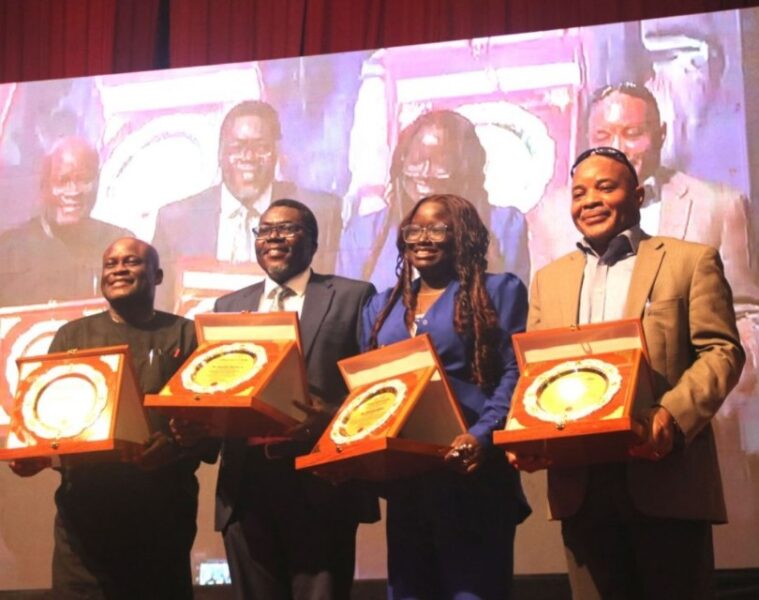1
Olusegun Vincent, a professor of Accounting & Corporate Finance, has charged his colleagues in the academia to ensure that current and future Accountants undergoing training in Nigeria are strategic business partners with capacity to leverage data for decision-making.
Prof. Olusegun Vincent, a lecturer in the School of Management and Social Sciences at Pan-Atlantic University/Lagos Business School, Lagos, Nigeria, spoke during the maiden Institute Chartered Accountants of Nigeria (ICAN) public lecture organised by the Office Of Advancement and the Board Of Trustees Of ICAN Professorial Chair in Accounting in collaboration with the Department Of Accounting, University Of Lagos (UNILAG).
In his delivery of the lecture titled, “Embracing The Future: Powering A New Era Of Accounting Education And Practice”, Prof Vincent lamented the disconnect between education and practice, saying the gap between academic education and industry needs hinders the preparation of graduates and called for a revised curricula that will evolved alongside trends in financial reporting, technology, and ethical requirements.
“The accounting profession stands at a crossroads where traditional practices meet digital transformation, and technical knowledge must be complemented by ethical judgment and technological literacy.
“For accounting to remain relevant and trusted, educators, practitioners, regulators, and professional bodies must collaborate to reshape the profession’s future.”
He called for enhanced collaboration between the academia, industry and professional bodies to produce a new generation and future ready accountants.
“A deliberate infusion of industry experts into teaching faculty has gone a long way to bridge the gap between the world of teaching and industry in many parts of the world.
“The collaboration could be achieved by deliberately employing professionals as fellows into the teaching faculty with their clear growth trajectory in the systems. Most of whom might not possess Doctorate but have read up to Master’s degree level, with relevant professional qualifications and good industrial experience in their kitty.
Furthermore, he suggested the development of joint programmes and internships with accounting firms, relevant organisations and tech companies, and setting up of industry advisory boards to review and update accounting curricula regularly, saying it will go a long way toward bridging the gap between industry and academia.
He added,”There is a need to organise guest lectures, mentorship programmes, and seminars featuring practitioners and IT experts from time to time. Embracing joint certification pathways, such as earning a professional qualification (e.g., ICAN, ACCA) alongside academic degrees.”
Prof. Vincent posited that the deployment of relevant technology in teaching accounting-related courses has become imperative considering technological disruption across financial reporting, auditing, cost accounting, and corporate finance, among others.
“For instance, financial reporting deploys Enterprise Resource Planning (ERP) software (e.g. SAP, Oracle NetSuite, and Microsoft Dynamics 365), auditing is carried out using systems such as ACL Analytics, CaseWare IDEA, TeamMate+ Audit, Audit Board, CaseWare Working Papers and corporate finance uses related tools such as Oracle Hyperion Financial Management, SAP Analytics Cloud, Bloomberg Terminal and so on. The deployment of technology is an inevitable investment. The universities need to determine funding sources, the specific ones necessary for the greater number of students, and the lecturers’ capacity in deploying the systems or technology,” he added.
He argued that a lack of access to modern educational tools and practical experiences in accounting technologies could reduce the effectiveness of accounting education and limits students’ readiness for contemporary challenges.
Professor Folasade Ogunsola, the Vice-Chancellor of UNILAG, in her welcome, noted that the public lecture could not have come at a better time than this period when the accounting profession stands at the intersection of rapid technological transformation, evolving business models, and an ever-changing global economy.
Prof Ogunsola, represented by Professor Risikat Dauda, the Chairperson and BoT ICAN Professorial Chair in Accounting, said significant changes in technology, business models, and the global economy necessitated innovation and ethical leadership in accounting and has made it imperative to keep future accountants abreast of developments.
She said, “The lecture series aims to reflect on and promote sustainable progress in Nigeria’s accounting sector.”
She expressed gratitude to ICAN for the partnership and commitment to excellence, saying the event is positioned as an opportunity for learning and collaboration among professionals, students, and the university community.
The panel session featured Dr Chibuzor Anyanechi from Risk Management Partner at KPMG West Africa; Dr Keeny Adedapo Soyemi, the immediate past chairman of ICAN Ijebu-Ode & District Society; Aderonke Ajiroba, the Chief Financial Officer at Ruta Exploration and Production Limited and the guest lecturer, Prof Vincent from Pan Atlantic University and Lagos Business School.
The panellists urged ICAN and institutions teaching Accounting education to retool, increase advocacy of professional development and urged students to to be disciplined, be practical and be in tune with emerging technological breakthroughs and development in the sector in order to remain relevant.
Dr Chibuzor Anyanechi emphasised, “Young people should be disciplined, and learned. When you learn, you will earn.”
Aderonke Ajiroba said, “Own your skill, be present, show up everyday, dream big, work consciously to archive success for yourself.”







